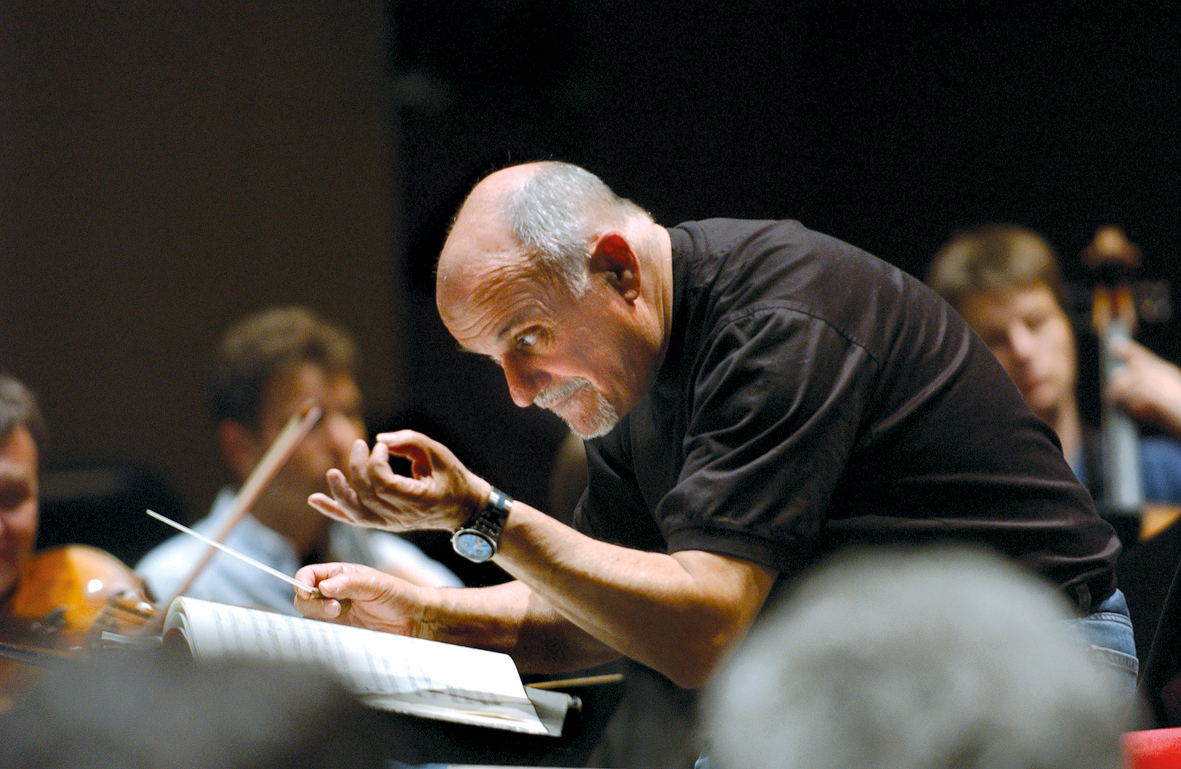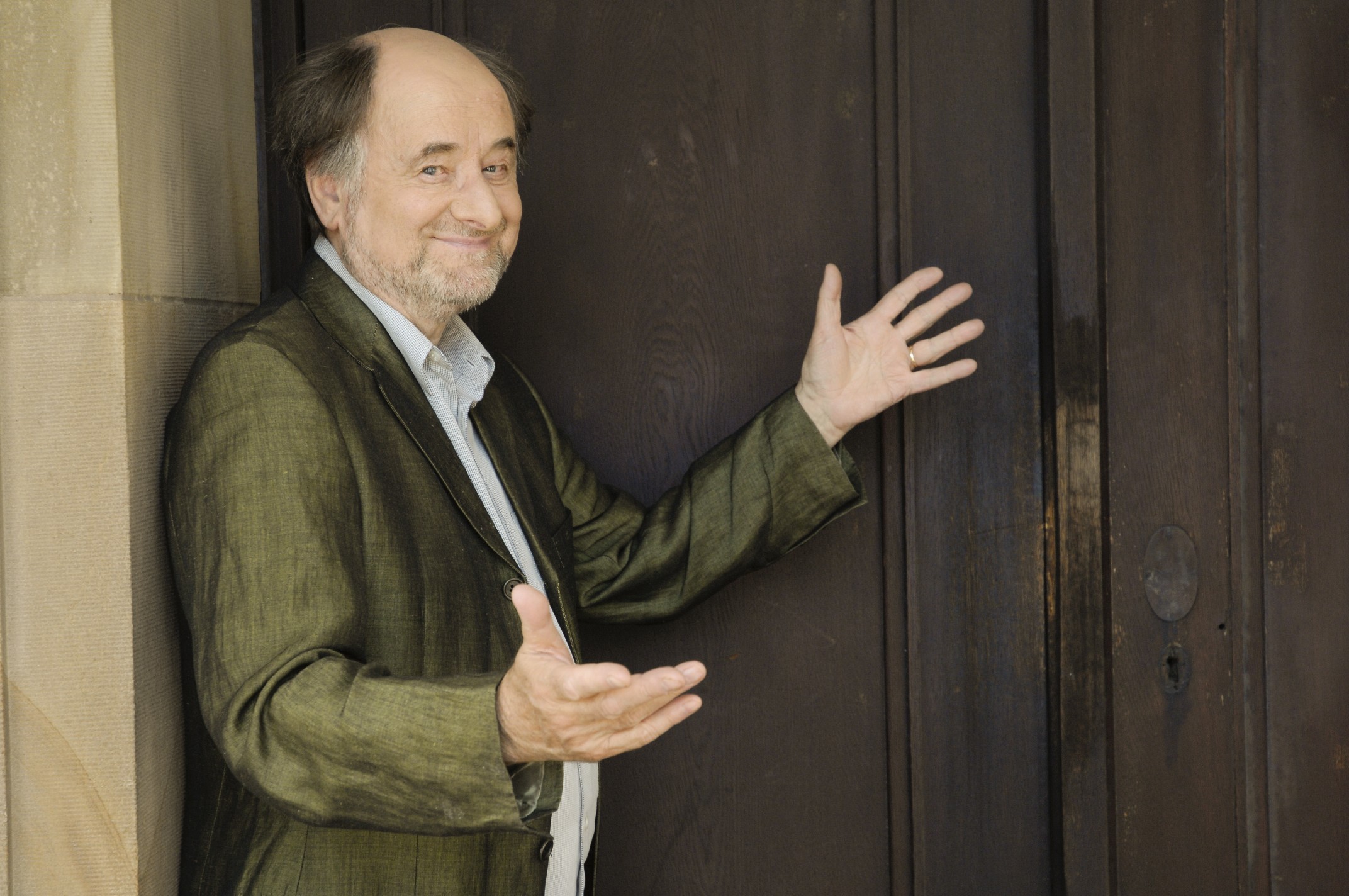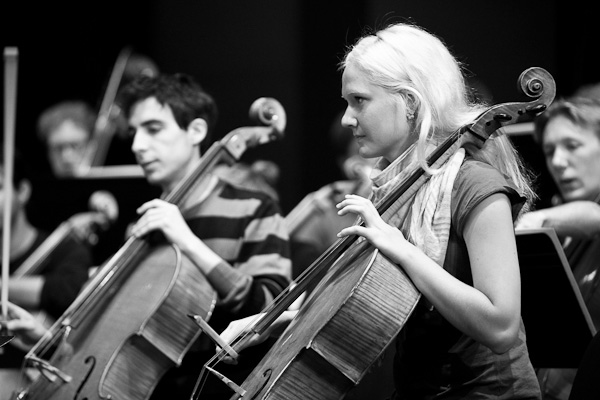“It’s great music and energising as well”

It took six years for conductor David Zinman and the Tonhalle Orchestra Zurich to finish recording all of Mahler’s symphonies – an ordeal but a nice one, says Zinman.
The cycle is crowned by the unfinished tenth symphony, composed at a time of emotional turmoil for Gustav Mahler after the discovery of his wife’s affair. The CD comes out on November 19.
Zinman, 74, the American in charge of the Tonhalle for the past 15 years, was jubilant as he marked the final recording earlier this year: “And he has survived,” he wrote on his website. “Quite an ordeal for an old man.”
In his office on a November afternoon, fresh from a rehearsal, Zinman laughs when reminded of the comment. “It was a nice ordeal,” he told swissinfo.ch.
“It is something that I have wanted to do all my life and it was a great challenge, of course, for myself and the orchestra to do these symphonies – but not a physical ordeal, just an ordeal to make sure that we kept going, that we were able to finish them, and also that we had the financial support.”
“But the music itself is no ordeal at all. It’s great music and energising as well.”
Incomplete symphony
The tenth symphony, whose release comes in the 150th anniversary year of the great Austrian composer’s birth, might be considered an unusual choice as it was never completed. Only two movements are close to finished, with the last three remaining as sketches.
Several attempts have been made by others to finish the symphony after the composer’s premature death – a controversial practice. Some conductors only sanction the Adagio, considered the most Mahlerian. Others never touch the Tenth at all.
Zinman says that it is possible to see where Mahler was going with the symphony. “It’s something you wouldn’t want to be without, even though its not completed by him,” he said.
Most people use one of several versions completed by the British musicologist Deryck Cooke. But Zinman has gone for the lesser-known take by the American Clinton Carpenter as it is “quite Mahleresque”. It also has not been recorded very extensively.
Mahler’s anguish
Zinman describes the Tenth as Mahler’s last thoughts before he died in 1911, aged only 50, of a blood infection which affected his already weak heart.
When he started composing, in summer 1910, the Austrian had just learned of his young wife Alma’s affair with the architect Walter Gropius. His turmoil is clearly heard in the music and despairing comments were scribbled onto the symphony manuscript. One reads: “To live for you, to die for you”. Later he adds, “Almschi!”
The Tonhalle played the Carpenter Tenth in public to good reviews earlier this year, echoing the overall excellent criticism – both in Switzerland and abroad – for the rest of the cycle.
Britain’s Guardian, for example, has said that Zinman and the orchestra “have established themselves in the last few years as exceptional, if provocative Mahler interpreters”. And writing earlier this month, the Telegraph praised Zinman’s interpretation of the Seventh as “the one that best catches the picaresque quality of the piece”.
Mahler misunderstood
Mahler was a very important musical bridge between the end of the 19th century and the start of the 20th century. His was a very personal, expressive music, much of which wasn’t understood in Mahler’s lifetime, Zinman says.
Indeed, the Austrian was more famous as a conductor, only composing during his spare time, which explains his relatively small oeuvre.
In addition, Mahler’s Jewish origins resulted in prejudice, especially in Vienna where he spent a large part of his career, and his music was later banned by the Nazis. His work only underwent a revival after 1945.
Zinman says the key to conducting Mahler is to remain as close to the composer as possible. “Many people think it should be hysterical and overemotional, but I don’t think that at all because he wasn’t that kind of person, he was a very precise person.”
Orchestra boost
During his time as conductor at Switzerland’s oldest orchestra, Zinman has helped boost its international reputation. The breakthrough came with the critically acclaimed recording of all of Beethoven’s symphonies, which have since sold more than one million copies.
Zinman, who divides his time between New Jersey and Zurich, loves his adopted city’s cultural and cosmopolitan side, as well as its tranquillity and closeness to nature.
Earlier this year it was announced that Zinman had renewed his contract with the Tonhalle until 2014. The seemingly tireless conductor already has big plans for the next season: recording all the Schubert symphonies and Mahler’s Das Lied von der Erde (Song of the Earth).
Next year will also see a special concert held in Zinman’s honour.
“I’ll be 75 years old and that’s a good birthday to celebrate. By the time I’m 80 who knows whether I’ll be able to walk or talk, so at least I know that one year from now I might make it,” laughs Zinman.
Born in New York in 1936, Zinman studied violin and later conducting at the Boston Symphony’s Tanglewood Music Center. There, he came to the attention of Pierre Monteux, who, in 1961, invited him to be his assistant with the London Symphony Orchestra.
He held several positions in the Netherlands before returning to the United States to the Rochester Philharmonic Orchestra and then the Baltimore Symphony Orchestra. He regularly guest conducts ensembles such as the Berlin Philharmonic, as well as orchestras in the US. He has been at the Tonhalle since 1995.
Zinman is particularly concerned with promoting young conductors, and was director of the Aspen Music Festival (1985-2009). In June 2010 the first David Zinman Conducting class was held in Zurich. Eight young conductors were chosen from 179 applicants.
Founded in 1868, the Tonhalle Orchestra is Switzerland’s oldest symphony orchestra. The Tonhalle concert hall, opened in 1895, is famous for its acoustics.
In 1999 the Tonhalle Orchestra Zurich won the German Record Critics’ Prize for its seminal recording of all the Beethoven symphonies. Since then more than 1 million Beethoven CDs have been sold. The orchestra is also known for its recordings of the orchestral works of Richard Strauss and the symphonies of Robert Schumann.
It is made up of just over 100 musicians and David Zinman, who has been chief conductor and artistic director of the Tonhalle Orchestra since 1995. The ensemble performs around 100 concerts a year.
The orchestra will return to the BBC Proms in 2011 (it made its debut there in 2003). It has been invited to perform at the Mahler celebrations in Leipzig in May 2011 and will tour Japan and China later in October 2011.

In compliance with the JTI standards
More: SWI swissinfo.ch certified by the Journalism Trust Initiative















You can find an overview of ongoing debates with our journalists here . Please join us!
If you want to start a conversation about a topic raised in this article or want to report factual errors, email us at english@swissinfo.ch.